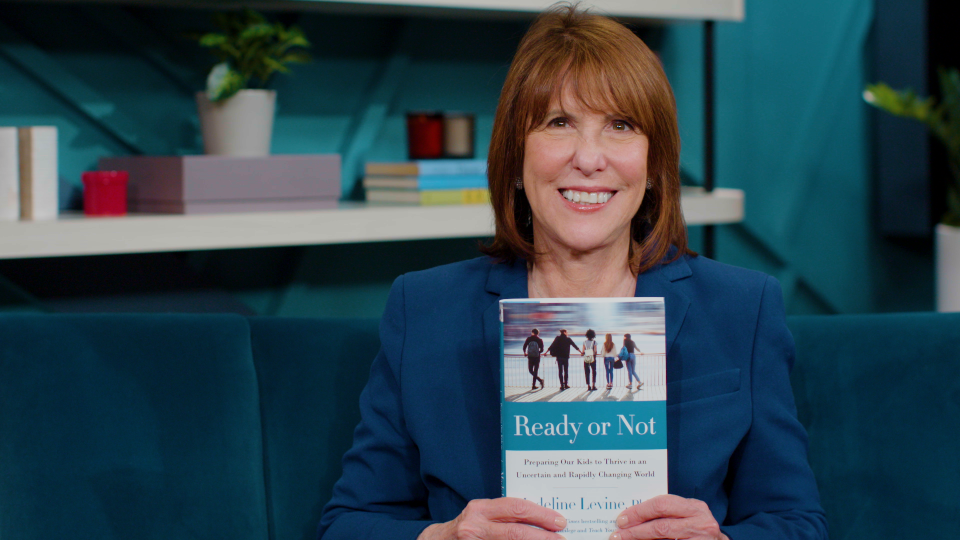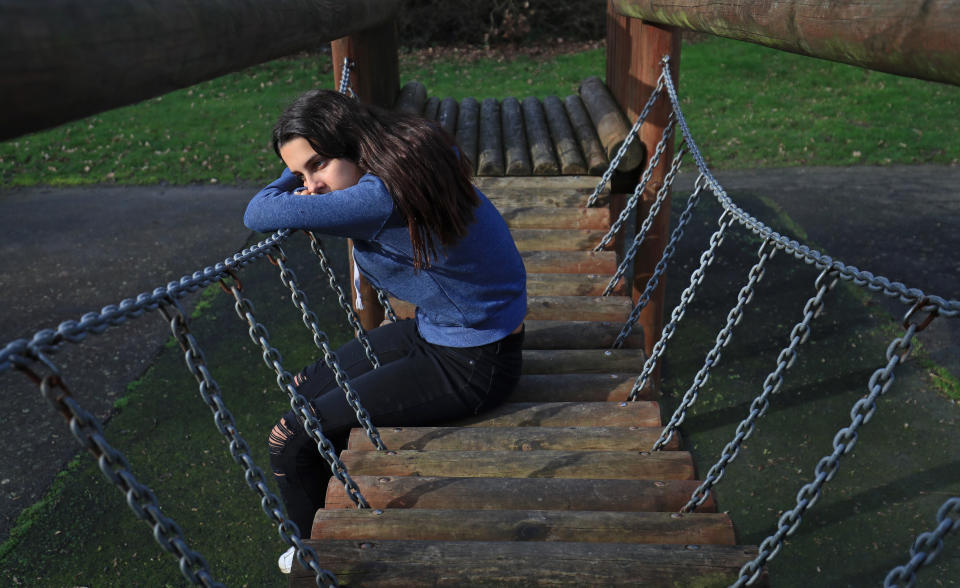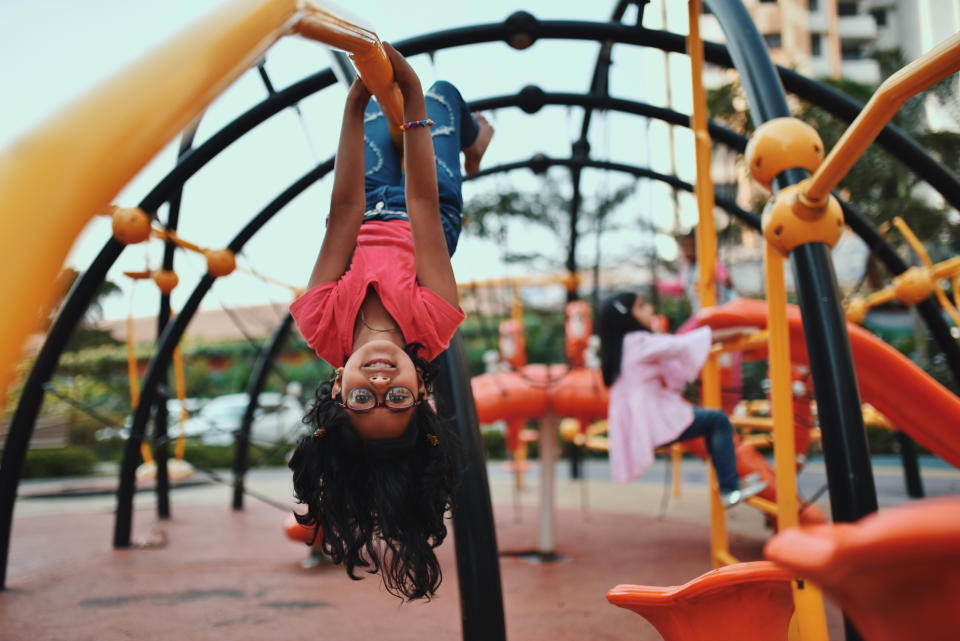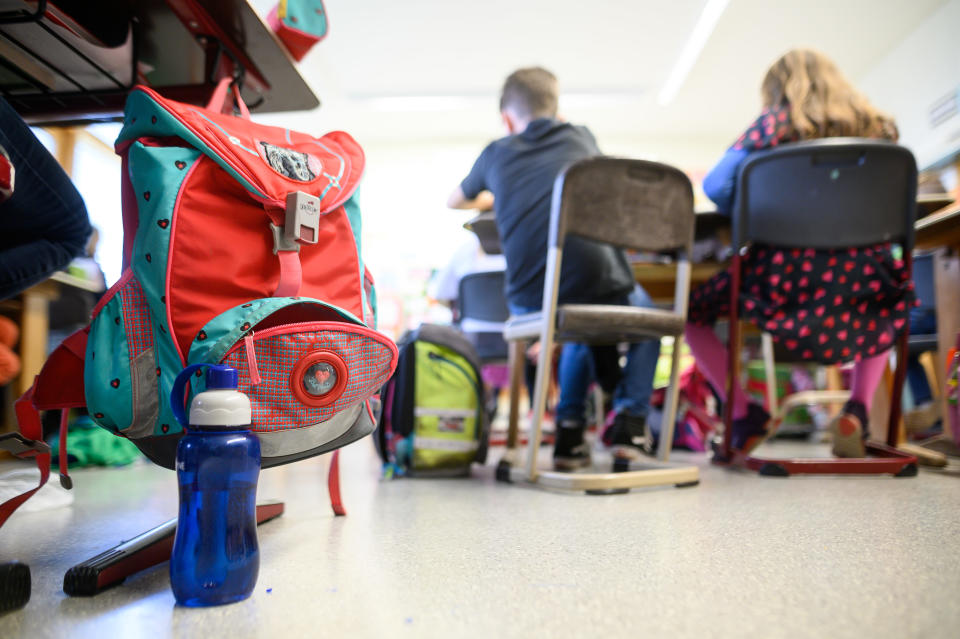Cashay conversations: Dr. Madeline Levine, clinical psychologist, talks about raising children the right way
Dr. Madeline Levine, a clinical psychologist and author of “Ready or Not, Preparing Our Children to Thrive in an Uncertain and Rapidly Changing World, sat down with Cashay’s Janna Herron to explain what parents today are doing wrong when raising their children and what they can do to course-correct.
The following interview has been edited for clarity and length.
Dr. Levine: My name is Dr. Madeline Levine. I'm a clinical psychologist and my new book is called Ready or Not, Preparing Our Children to Thrive in an Uncertain and Rapidly Changing World.
So I wrote two books. One 12 years ago, one six years ago, on the state of mental health among children in the United States and I've spent 12 years going around the country as have a boatload of my colleagues on the same thing, talking about decreased levels of good mental health among our kids.
And you would think that might have moved the needle, but it actually didn't in spite of a boatload of research that tells us kids need to sleep more, kids need less pressure on them, kids need more play time. And it's not like parents disagree, they're just having tremendous trouble implementing that. So I got interested in why didn't the needle move.

Not only has it not moved, but rates of anxiety disorders have escalated. Now one in three children have an anxiety disorder according to the World Health Organization, but so does one in three parents. So it's not just children, everybody's really anxious and I think what's happening is parent's anxiety about how to prepare their kids for this very uncertain world that we're facing, what your children will do in life is totally unclear now, we just don't know what kind of jobs.
So there's anxiety about preparation, there's anxiety about school massacres, there's anxiety about getting into school, there's anxiety about climate, there's just a boatload of anxiety. And I think what parents are doing is they're trying to lower anxiety in the wrong ways and not lowering anxiety in the right ways.
Janna Herron: So can you start with what parents are doing wrong? What is it that's making themselves and their children more anxious?
See also: How to ask Mom or Dad for a loan the right way
Dr. Levine: Right. So the things that we know from research that parents are doing wrong, is not protecting their kids' physical and mental health in terms of sleep, in terms of reduced pressure. The number one cause of pressure for kids in the United States is now school because there's so much emphasis on grades, homework and all that stuff. Those are the things parents should be attending to because they really are sickening kids who don't have a lot of coping skills to deal with that kind of pressure. What we are doing that I think is a mistake, is because we know our kids are stressed out, we're trying to lessen their burden around things that are just kind of normal anxiety.
Kids going to camp, they're anxious. First time you go to camp, everybody's anxious, but the parents are saying oh, you're anxious. Honey, you don't have to go. Or a sleepover, you don't have to do it because I know you're anxious. Or driving around the block on a bike and the parent's worried that some perverts going to jump out and the kid's worried because they've never driven the bike around and the parent gives the kid a pass, you don't have to do it yet. So these are the normal developmental challenges that kids need some practice in seeing they can fall down, they can not it right the first time, but they can manage.
And parents need to be more tolerant of their own anxiety. If your kid's all upset, you're upset, right? So we need to be a little bit more tolerant of our own anxiety around things that are just part of life. And how does a kid eventually learn to manage really difficult things? I gave a talk right before I came to New York, asked a big audience how many people never had their heart broken? One person out of 500. One person out of 500. Well, in order to have your heart broken, which is going to happen, you have to have a little heart breaks along the way like you didn't get invited to the party or you didn't make the varsity team, and those give you muscle you'll need eventually when you really have your heart broken.

Janna Herron: Why do you think parents are doing this? What has changed so that they're doing these kinds of behaviors that make their children more anxious?
Dr. Levine: I think there's a great deal of fear in the world. We just saw the Varsity Blues Scandal where people come in and pay half a million dollars to get their kid into USC and lie, cheat, and steal to do it. What would make a parent do that? It's terrible for the kid, the kid feels like they didn't get in on their own, the parents now compromised their integrity and I think that it's being driven by a lot of fear. Or what if my kid doesn't get into a good school? What if my kid doesn't get a job? That way of thinking about parenting is passed its expiration date. That you have to get great grades, go to a great school and know what you're going to do and you'll be fine.
That just isn't the way it works. Most big companies now are far less focused on where you went to school than they were previously. I'm a psychologist, my husband's a doctor, we got good grades, we went to school and that was that. But nobody thinks that that kind of hard skills is going to be as important because you can Google anything. You have access to information 24/7. You have to know how to put it together, you have to know how to work with other people, you have to know how to use it creatively. So it's an entirely different skill set and we're parenting on an old parenting paradigm because in times of uncertainty, we get very conservative.
Our brains make us conservative and if you're uncertain, you're likely to look to the past when you should be looking to the future. So you might say I went to Colombia, that's going to be great for my kids, I did fine. Maybe, maybe not, because we don't know what our kids ... I know what my kids are doing because they're grown up but you don't know what your kids will be doing.
Janna Herron: So you talked about some of the unhealthy overachieving the false self, can you tell us a little bit about those five things? What are they? And what does it tell us?
See also: Having a baby? Here’s how to plan financially
Dr. Levine: So unhealthy overachieving, one of my patients said to me I'm only as good as my last performance, which means I'm only of value by what I do. And nobody can feel that way and feel really good about themselves because if you're a child, you're supposed to be valued because you're a good person or you're just loved because you're a kid. So, there's cheating, I co-founded an organization called Challenge Success at the Stanford Graduate School of Education and we've done a lot of research on cheating. So the vast majority of kids cheat, it's about 89%, and it's disproportionately among high achieving kids. We think of cheating as like I'm going to fail, it's not, It's I'm going to get an A- and I want to get an A, so I think I'll cheat.
And you don't learn your material that way. You're compromising your integrity. And when you speak to the kids, they don't see it as a moral issue at all, they see it as sink or swim. If I don't do this, I'm in trouble. And they bought into the last 20 years? 15 years?
Of a cultural narrative that says in order to be successful, you follow this narrow path, you do everything right. Go to the right schools, get the right job, and life will be good. But the reality is very few people actually follow a straight path. Every time I speak, I ask my audience how many people feel successful in following a straight path? Because there's certainly people who did that. Everyone in the audience, and this is around the world, it's been 1-10% of people who felt that was their trajectory.
It means 90-99% of us ... I was a teacher, I was a recreational therapist, I was a social worker, and even more, that's in my day, and in your day I suspect it's even more. People finding what they're good at, what they like and so anyway, that's about unhealthy overachieving. What was the next one?

Janna Herron: The next one was the false self. What is that?
Dr. Levine: False self. So the false self is it's not me that's valued, it's what I present to the world. So my book The Price of Privilege 12 years ago opens with a very attractive girl driving up in a BMW and she's wearing a cutter t-shirt, one of these T-shirts that hides the fact that she's cutting. So as a psychologist you know that that's what people or what girls are wearing those t-shirts. So I have her take it back and she's written the word empty on her arm with a razor. And that was the beginning of my thinking about this whole issue of the false self, was for all the world she looked great. She was well dressed, very social, she learned social skills of the upper middle class, but she had nothing internal.
Everything that happened to her was external. Praise was external, the achievement was external because she was cheating, so she really felt empty and that's the false self is the presentation. And now, I guess I'd have to make the case that things like social media really exacerbate the false self. I saw Weiner wrote an article about how bad she felt about her body after J.Lo performed at the ... and she's a grown woman. So this constant, compulsive comparison and you're always going to lose because everything is curated. So I think kids present themselves in a particular way and it's not who they really are.
Janna Herron: Right. And it's not just the kids, but the parents too. Here's the perfect vacation we went on. This is this and so even when we go on Facebook, nobody's lives look like Facebook. Even your life doesn't look like the Facebook that you put on because you're putting the best forward. Okay.
Dr. Levine: And what makes for real relationships? It's authenticity. It's that you know something really deep about me or I know something about you and it's unfiltered and it's not prettied up. And I have some concerns about the way kids treat interpersonal relationships. So often a girl will walk into my office sobbing with her phone and just hand me the phone, and her boyfriend's just broken up with her or ghosted her or whatever, on social media and it really varies from the thoughtless to the incredibly cruel. And I don't think that's necessarily how people would be, I think, if they were making eye contact with each other.
So I think this has made things worse and I do worry about ... And you have to learn to get along with other people and have authentic relationships. I think that's been cut into.
Janna Herron: So does that also lead to social isolation, which you also mention in your book?
Dr. Levine: Right. So I talk a lot to teenagers and I worked with teenagers for most of my career, and I will often talk to them about three things that characterize adolescence. [...] They focus on identity issues, they focus on isolation, they focus on how they're doing in the world. And I was convinced that identity, which has always been the biggest issue with teenagers, that's what adolescence is about, who am I? What do I believe? I don't know what it is now, am I Goth am I a jock, what am I? But it's not, it's consistently isolation, which is so interesting because they are always appear connected and they have friends and they have Instagram accounts and Twitter accounts and all this kind of stuff. But the number one thing that they talk about is a sense of isolation.

Janna Herron: Wow. And then you talked about a feeling of being powerless and a shaky sense of morality. I think we talked a little bit about the shaky sense of morality with the whole cheating, that seems to be more commonplace than you would think. But this feeling of powerlessness, what is that about?
Dr. Levine: So I think the example that's at the top of my head, I live in San Francisco, I live near Palo Alto and one of the schools down there had two clusters of suicides of these kids standing on the railroad tracks. One was five kids were killed and the other was seven kids were killed, in a row, in a short period of time. So it's tragic that all these kids died by suicide. But what was interesting to me, was there were many meetings and many experts called in and the kids wrote and the parents, a lot of crying, a lot of upset. But when the kids wrote letters to the parents or wrote online or wrote blogs, they were always why don't you do something about it? One girl wrote our parents are standing by while we die. And what strikes me about that is this is an 18 year old girl. She could say no. She could say we're not doing this. I understand when you're in high school you don't have the same ability to change things as an adult does, but it strikes me that kids had bought in to a kind of a passivity and I hear this everywhere I go. They're excellent sheep. They just keep going along and to me they say Doctor Levine, you're so naïve. I have no choice but to do this. And in fact, they do have choices, they just don't feel like they do, just like the parents don't feel like they have the right to say in my house you go to sleep at 11:00.
Or in my house homework's over at 11:00. Or in my house there's no screens in the bedroom. Parents can say, they don't feel that they can. They feel like they're risking their child's success, when in fact I think the argument that they're risking their child's mental health.
Janna Herron: So, as a parent, what are the things that I can do, or should be doing? I have a 10 year old, so I might be doing things wrong for 10 years, but I'm going to correct it starting today. So how do I go about that? What are the tools that parents need to help their children and help themselves?
See also: How to plan financially for children with special needs
Dr. Levine: So what you just said is super important because you can't help your kids unless you're okay. We know depressed moms have a much higher incidence of depressed children or anxious children. And so you check yourself first, figure out what your issues are, make sure they're not getting in your way, and I think that's an important thing to do. You have to listen more to your kids. I'm a psychologist for 35 years, no kid has ever walked into my office and said my parents listen too much, it just has never happened. They come in and they say my parents talk too much and they never listen to me. I think we need to listen to kids, show some respect and it helps them to figure out whatever the problem is.
So if you're not that far from having a toddler, and when you had a toddler and she'd fall down and you'd look at her and you'd go okay, get up, honey. And you didn't go nuts or anything like that and that attitude towards risk taking, that's risking taking for a 13 month old or something like that, you're encouraging it. You like the challenge. The kid likes the challenge, looks to you for the okay to keep going. And we would never say to that kid well, if you keep falling down, you're going to be flipping burgers at McDonald's for the rest of your life. We know that she has to have those experiences of falling down.
And I think when we listen to kids, when we ask questions like tell me more about that, what was that like for you? Or I think you can handle it, which is the message you're giving the toddler. I think you can handle it. I think that's the best message that a parent can give a kid. You're always standing by if there's real trouble, but I think you've got this. Those kinds of messages are incredibly helpful as kids struggle with the kinds of things that are part of every day life for children.
So listening more, knowing yourself, not just tolerating but encouraging challenge in your children. Having some activities that don't include your children I think is a really good idea. I think moms are exhausted and overwhelmed, and dads, and I think it's really important, this goes back to the morality thing, I think it's very important to show that there is a world beyond your kitchen table.
See also: How to lifestyle plan when you start having children
There is a world that needs some social justice. There is climate change, there is school massacres, there's all kinds of stuff. So you either do something for the world or you do something for yourself. I was at a talk and a woman came up to me, and I've been saying this for a long time, and she said I just want you to know, I heard you 10 years ago and I went out and formed a tennis group. My kids are 8 now and it's 10 years later, we still play tennis every week, my kid's going to college and it was a good thing to do. So this intensive, intensive parenting where all your time, all your money is devoted to your kids, I think is a mistake.
Janna Herron: Just having that time to yourself really helps you mentally, a lot.
Dr. Levine: Absolutely. We call it restorative time. There is time that you need to just be and I think that's very hard to come by. I just became a grandma, so-
Janna Herron: Oh, congratulations.
Dr. Levine: Yeah, thank you. That's got the toddler falling down and I see my kids just going okay, you're fine, get up. It's such a good model, I'm sorry I'm back to that, but it's such a good model for how a parent can encourage a child to keep going.

So I see the struggle of two working parents and a young child and more of an older child, doesn't matter, and how little time there is for yourself. The problem is your kids will grow up, the problem? The reality is they will grow up, they will go to college, it's what you're working towards, and at that point, we have mothers who are doing the laundry for their 29 year old lawyer kids and oh, lawyers work so hard. Hard, I’m from New York originally. Let me do his laundry for him, let me make the bed for him.
There is a momentum that starts in adolescence of separation from the parents and I think if you lose that momentum, there's this whole idea of emerging adulthood now. Well, there was no such concept as emerging adulthood when I was in graduate school, but now there are programs all over the country for it. And that's for kids who never had to make the bed, who never had to make a meal, who never had to write a check, nobody writes checks, but that kind of thing. So I think parents stay very attached to their kids a little too long, a little too intensely, without any respite for themselves.
Janna Herron: How do you think, especially for millennials, that age group, the great recession happened when a lot of them were graduating and going into the real world and they just had no jobs, so many of them moved back in with mom and dad and stuff, do you think that plays a part? Or do you think that's just something separate from what you're seeing now?
Dr. Levine: No, I do think it plays a part, actually, in a particular way which is around anxiety. So since the recession, the economy's completely bifurcated, the income equality is at the highest level ever, and so it's win or lose. I think most parents say it's winners or losers, that's what came out of the recession was winners or losers, and so they've doubled down on these outdated paradigms about what it takes to be successful. So there's that.
See also: Why only 1 in 4 young U.S. adults are financially independent from their parents
There is the amount of debt that young people have that is killing them. My youngest son went through law school and his brand new wife went through a physician's assistant program, they have $200,000 worth of debt like many kids and that means you can't get on with your life and you are, in a way, kept in a dependent position if you don't have enough money to basically live as an adult.
So I do think the recession had a big impact and a big cynical impact on we're all suffering and those guys, nothing happened to them. So I do think it had an impact, yeah .
Janna Herron: Right. That kind of plays into the morality too, maybe.
Dr. Levine: Yeah. For sure.
Janna Herron: Like I said I have a 10 year old son, and so maybe I want to change my ways, maybe my children are getting older and older and I'm realizing that oops, I screwed up and I didn't help them. How can they change?
Dr. Levine: How can the parents change?
Janna Herron: How could the parents change? How are you going to help them change? What can young adults do if they realize oh, I suffer from a lot of these things.
Dr. Levine: So first of all look, kids are very forgiving. I was joking around today, I always say you don't sleep with a child in your bed. My younger son slept in my room probably until he was seven and was that great parenting? I don't know. I was exhausted, I had three kids, my husband was a surgeon on call, my mother was sick, it really wasn't out of lessening his anxiety, it was just a tired.

Janna Herron: Everybody needs to sleep.
Dr. Levine: I need to sleep. So we're going to make mistakes, we have to be okay with that. The research is if you really love your kid and you're really okay setting limits on your kid, that's called authoritative parenting and it's the best kind of parenting paradigm we have. So will there be mistakes? Sure. And I think part of the restorative time is to be able to step back and say okay, what am I doing? What's my dinner table like?
I'm really big and have been on have dinner with your kids, and it's not easy, it's not easy at all. My husband was a surgeon, that meant he was working late and sometimes it meant we all ate dinner as a family at 9:00 or 10:00 at night. But it was a statement that at some point every day, this family gets together.
It's the most important thing that we continue to do that. Did we miss it sometimes? Of course, but I think most well intended parents have kids that are okay ... Remember, one in three kids has an anxiety disorder, that means two and three don't. So we have this intersection called epigenetics where anxiety's 30-40% genetically determined and so not everybody has an anxiety disorder. So you create an environment that doesn't cultivate anxiety. Probably everybody who's watching this has somebody in their family who was anxious. Some aunt, some uncle who drank too much, we just have a lot of genetic material, but if we can keep a reasonably calm, loving, supportive, structured environment for our kids, most of them turn out fine.
Janna Herron: You talked about in your book, there were a few examples about preschool that this one child had gone to that was just everybody was sitting down and quiet and it was just not the right environment for the child. What are some other examples? Or what should you do as a parent when you're looking at other environments that you're sending your children into?
Dr. Levine: And that's such an important point because your child's with you a lot, but not only. So it's not just what's going on in your house, it's what's going on in school, what's going on in the community, and I want a little disclaimer in here now, and the disclaimer is every child's different, every family's different. What researchers do, we take thousands of people, we look at them and we say, he's 10? Your child needs 9-10 hours of sleep at night, does he get anything like that?
Janna Herron: Actually he does. I was trying to figure it out when I was reading your book and I was how much time does he sleep? And I was like oh, he gets 9-10 hours. Great.
Dr. Levine: Big head start right there. So there's multiple things that are impacting your child, multiple environments out there and every child's different and every family's different. So that story is partly from a case I had and partly from my own son who walked at 9 months, so I thought he was going to be a baseball star of course, and then I learned as time went on that lots of kids walk at 9 months, there's this variability in child development. And I went to this school with him and the teacher walks us in and says you can hear a pin drop, as if this was a good thing, my kid was four and hanging off the rafters. So I knew he'd spend the rest of his time in preschool in the principal's office. So for my kid, that was a really bad idea.
We know that play based preschools are better, in terms of outcome, than academic based preschools for most kids. Are there some kids who would do just fine? Sure. So I think the caveat that I want to put out is everything I say is true for groups of people, and some of them I think really are pretty much regardless of your family constellation, but not everything. And so your first job is to know your kid. And to know your kid, you have to have some bandwidth that's not racing to work and racing to school and racing to soccer and racing to music lessons. To just hang out and spend time with your children.

Janna Herron: You also talked about the importance of unstructured time for children.
Dr. Levine: Right. So we have this project at Stanford called Challenge Success, we have PDF which stands for playtime, downtime, family time. And we really believe, and the research backs us up, that kids and parents should have some playtime, downtime, family time regularly. Will you have that every day? No, you're sitting here with me right now, you're not having that right now. But it's really an important thing because you take something as incredibly simple as a game of tag, and it looks like absolutely nothing's happening, it's just two kids running around on the playground. But tag is all about power relationships and compromise and collaboration because if one kid says I'm not playing, the game's over. And since what we're told going forward is collaboration, being able to work together and take risks and have fun, it's going to be really valuable.
So that's a huge real life experience for a child in all the things that are likely to be important going forward. And this is how kids learn, they learn through, I don't know about your kid, my kid for two years his favorite toy was a pot and a spoon. People are bringing in educational toys, people buy Baby Einstein, which by the way retards language acquisition by about eight words a month, so stay away from all of that stuff, let your kid get down on the floor. We say 20 minutes a day of floor time with your kid is the best thing you can do with a young child, you asked me about young kids before. So play.
Janna Herron: So if you look down the road and you have one child who is raised in this anxious environment and then one that's not, what does that mean for their outcomes? What would they become adult-wise?
Dr. Levine: Well, it depends on who they started out being, of course. So let me talk about the kid who's got the anxiety disorder. We can treat an anxiety disorder pretty well in a young child. Give me six weeks with a parent of a child who's really fearful and I do a pretty good job with that. If you wait until that kid is 28, they're probably substance abusing, which means they're probably depressed on top of the anxiety. So if you suspect that your kid is particularly anxious, you want to talk to the pediatrician. You have one child, he's seen 10,000 children, so he has a better idea of what's normative and what's not normative.
These are the kids that I have been putting into, the anxious kids, into emerging adulthood. They have what I would call accumulated disability. All those times that their curiosity or anxiety was accommodated to, my favorite one is the kid who didn't like sauce. Young girl, she wouldn't eat sauce, so she wouldn;'t eat sauce at home, yeah, it's funny. And mom would have to call whenever she was invited to dinner and say my daughter doesn't eat sauce, so no sauce. Aside from the fact that that's nuts, because she won't get more exposure, what do we do in the office with somebody who's afraid of sauce? We expose them to it. We don't protect them from it.
So the kid who has been protected over and over again, they end up often looking spoiled and entitled. I have a case of a kid who was at the University of Texas for nine years, getting $9,000 a month and not going to school. And actually, when I wrote the book, my editor said you've got to change that, nobody's going to believe it was $9,000 a month, but it was. It was $9,000 a month, and he didn't have to do anything for it. And then of course his parents are furious nine years later and they bring him home and he looks very spoiled. I'm not going to work at Starbucks and I'm not going to, and he's smoking weed in his parent's basement, that's all he's doing.
See also: 7 financial mistakes new parents make
And when you get down to it with him, it's not just that he's spoiled, he doesn't know how to do anything. It was like well you've got to go to Starbucks and work and he doesn't know how to make change, he doesn't know how to talk to people, he doesn't know how to set an alarm clock. So a lot of these kids who look incredibly spoiled are just incredibly incompetent and they go away to these very expensive programs where they learn how to take care of their emotions and they also learn how to make a bed at the same time.
Anxiety is impairing, we don't make good decisions. When we're a little anxious, actually, it helps us, but when we get really anxious, we don't make good decisions. We're impaired, it means we're not firing on all cylinders, we're using up bandwidth to deal with the anxiety. Another kid who is very anxious because his father is graphing every calculus test he takes in a private high school here in New York, and the kid's taking calculus, he doesn't need somebody graphing, and the father's just making him nuts. He's got trichotillomania, so he's pulling out his hair, he's pulling out his eyelashes, pulling out his eyebrows, and the dad says, this isn't in answer to what happens down the lane, but dad says he'll stop that once calculus is over.
And the answer is no, he won't because this is the coping mechanism he has learned to deal with the anxiety you’re creating for him. So that kid is going to have bad habits, poor coping skills and won't be able to use the skills and the talents that they have optimally.

Janna Herron: Grades are important, so why wouldn't a parent want to push on grades?
Dr. Levine: Okay, so there's a fabulous experiment by a gal named Carol Dweck at Stanford who's known for mindset, a great psychologist. And she takes kids and she gives them all a puzzle that they can all figure out, baseline. And then she divides them into two groups. In one group she tells them how incredibly smart they are and how they're going to have a great time and an easy time because they're so smart with the next set of puzzles. And the other group she tells nothing to them and gives them another set of puzzles. Who does better?
Janna Herron: The ones that didn't have anything said to them.
Dr. Levine: Right. Why?
Janna Herron: Because the expectations are that they should be doing really well and that creates anxiety?
Dr. Levine: That's exactly right. Are you sure you didn't study psychology? And what happens with the group that was told how smart they were? It's really interesting. They do the same puzzles over and over and over again because that's where they know they're successful, but they're not learning anything. And the other kids who have nothing to lose in terms of your admiration, they make mistakes, they fail. The first couple minutes it looks like the other kids are going to do better, but give them 10 minutes and the other kids were willing to try all kinds of stuff that the ‘smart’ kids are afraid to try.
Janna Herron: That's interesting. As a parent, are there often physical signs of distress so you know that maybe your child is having anxiety disorder or having issues with anxiety?
Dr. Levine: Sure. So in children, the first thing we look at and look for are physical symptoms. So if your kid has headaches or stomach aches or is very teary before every soccer game or migraines or has to come home from school, those are your first signs of stress in children. And we tend to blow that off with that oh, it's just psychosomatic or it's not real, but that is how kids ... because younger kids can't say you're making me anxious by your constant hovering, but they can say I have a headache, I'm going to lay down. So those are really important thanks for bringing that up.
Janna Herron: Yeah, no, I actually, just a little quick personal note if that's okay, my son he has swimming every Tuesday morning at his school because they have it and he hates it, I know he hates it. And so every Tuesday it's always terrible in the morning, he's just like I'm really kind of cold, I think I'm coming down with something. And so at one point I talked to him and I asked what is it about swimming in particular that you really don't like? And he said I'm in the highest swimming group and I don't think I belong there, I think it's too tough. And I said okay, can you try talking to the swim teacher-
Dr. Levine: You're doing everything right, by the way.
Janna Herron: But he always kept saying I'm too cold today, so I don't think I should go swimming and finally I was just like let's try to figure this out. He did talk to the swim teachers and I have to remind him every so often, remember last time it was a lot of fun? Remember it was more fun than you expected? He's like yeah, yeah, all right.
Dr. Levine: And I know you're uncomfortable, I think you can handle it. But everything you just said suggests you said like oh my god, it's 10 years, what if it's wrong? Everything you just said in terms of how to get him to address what's going on, tell me what's going on and to listen.
Janna Herron: I've done some things that were wrong too, according to your book.
Dr. Levine: We all have. We all have.
Janna is an editor for Cashay and Yahoo Finance. Follow her on Twitter @JannaHerron.
Read more information and tips in our Family section





